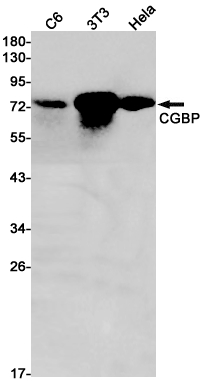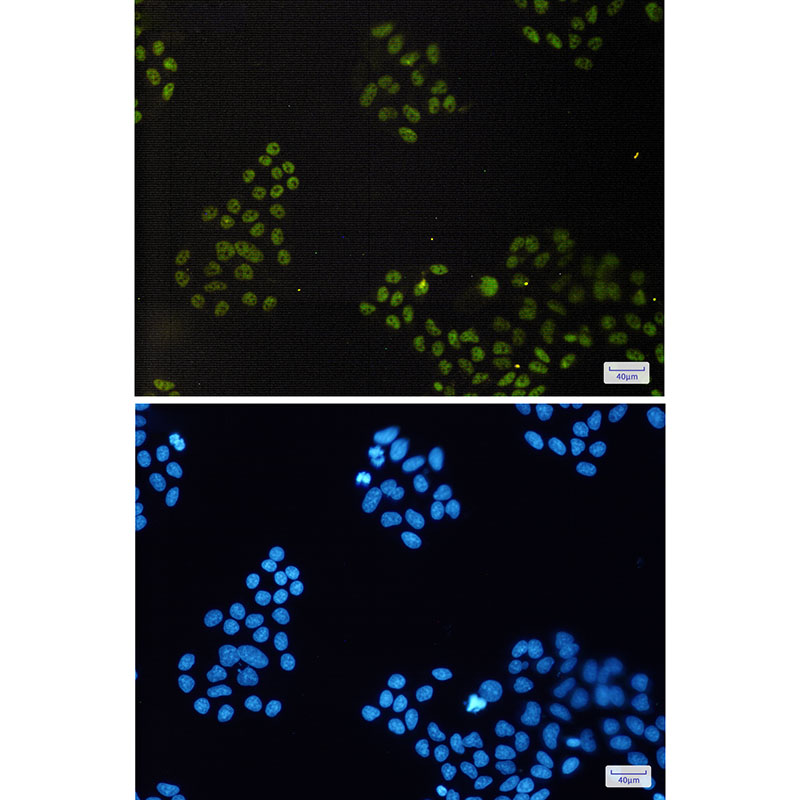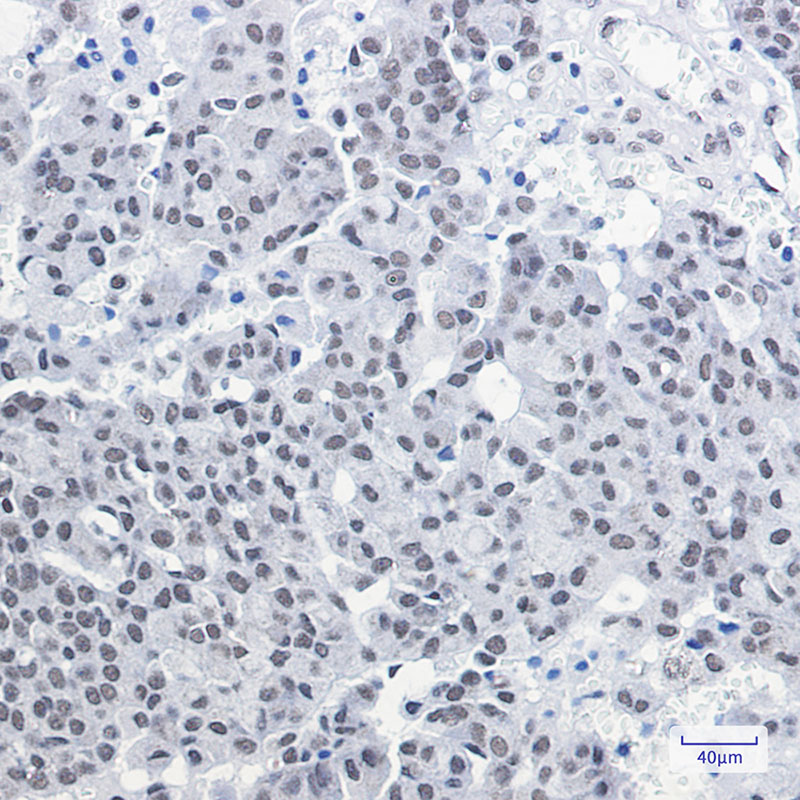


| WB | 咨询技术 | Human,Mouse,Rat |
| IF | 1/20 | Human,Mouse,Rat |
| IHC | 1/50-1/100 | Human,Mouse,Rat |
| ICC | 1/50-1/200 | Human,Mouse,Rat |
| FCM | 咨询技术 | Human,Mouse,Rat |
| Elisa | 咨询技术 | Human,Mouse,Rat |
| Aliases | CFP1; CGBP; SPP1; PCCX1; PHF18; hCGBP; ZCGPC1; HsT2645; 2410002I16Rik; 5830420C16Rik |
| Entrez GeneID | 30827 |
| WB Predicted band size | Calculated MW: 76 kDa; Observed MW: 76 kDa |
| Host/Isotype | Rabbit IgG |
| Antibody Type | Primary antibody |
| Storage | Store at 4°C short term. Aliquot and store at -20°C long term. Avoid freeze/thaw cycles. |
| Species Reactivity | Human,Mouse,Rat |
| Immunogen | A synthetic peptide of CGBP |
| Formulation | Purified antibody in TBS with 0.05% sodium azide,0.05%BSA and 50% glycerol. |
+ +
以下是关于CGRP(降钙素基因相关肽)抗体的参考文献示例(假设用户指CGRP抗体,因该领域研究较多,可能与“CGBP”存在拼写误差):
---
1. **文献名称**: *Efficacy and safety of erenumab in chronic migraine*
**作者**: Dodick DW, et al.
**摘要**: 该III期临床试验(NCT02066415)评估erenumab(CGRP单抗)在慢性偏头痛患者中的疗效与安全性。结果显示,每月皮下注射erenumab显著减少每月偏头痛天数,且耐受性良好。
2. **文献名称**: *CGRP and its receptors provide new insights into migraine pathophysiology*
**作者**: Edvinsson L, et al.
**摘要**: 综述CGRP在偏头痛病理机制中的作用,阐述CGRP受体拮抗剂及单抗类药物如何通过阻断CGRP信号通路缓解偏头痛发作,为靶向治疗提供理论依据。
3. **文献名称**: *Long-term safety and efficacy of fremanezumab in episodic migraine*
**作者**: Tepper SJ, et al.
**摘要**: 长达12个月的扩展研究证实,fremanezumab(CGRP单抗)在阵发性偏头痛患者中持续减少头痛频率,且未出现严重不良反应,支持其长期临床应用。
4. **文献名称**: *Monoclonal antibodies for migraine prevention: Progress and challenges*
**作者**: Goadsby PJ, et al.
**摘要**: 分析CGRP单抗类药物(如galcanezumab、eptinezumab)的临床进展,讨论其在预防性治疗中的优势及个体化用药面临的挑战。
---
**备注**:以上文献为示例,实际引用时请通过PubMed或Google Scholar核对真实文献(搜索关键词:CGRP antibody, migraine, clinical trial)。如用户确指“CGBP”抗体,建议进一步明确术语定义。
CGRP (calcitonin gene-related peptide) antibodies are therapeutic or research tools targeting a neuropeptide involved in vasodilation, inflammation, and pain signaling. CGRP, widely expressed in sensory neurons, plays a key role in migraine pathophysiology by promoting cranial vasodilation and neurogenic inflammation. Its dysregulation is linked to chronic pain conditions and cardiovascular disorders.
In the 2000s, research highlighted CGRP's central role in migraines, prompting development of monoclonal antibodies (e.g., erenumab, fremanezumab, galcanezumab) to block CGRP or its receptor. These antibodies bind with high specificity, preventing CGRP-mediated activation of trigeminovascular pathways. Approved for migraine prevention in 2018. they offer prolonged efficacy with monthly or quarterly dosing and fewer side effects than traditional therapies.
Beyond migraines, CGRP antibodies are explored for cluster headaches, neuropathic pain, and ischemic conditions. Their success has reshaped neurology therapeutics, validating CGRP as a critical target. Research-grade CGRP antibodies also aid in mapping peptide distribution in tissues and studying its physiological roles. Challenges remain, including cost and variable patient responses, but CGRP antibodies represent a breakthrough in precision medicine for neurological disorders.
×